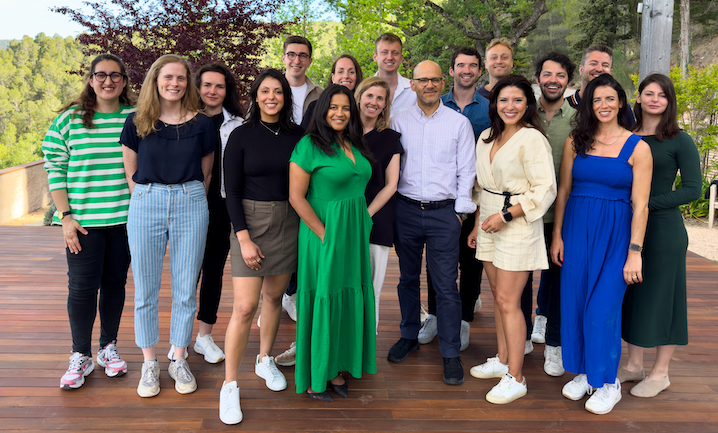European early-stage investor Seedcamp has announced the $180M close of its “Fund VI”.
It’s a long way from a London university lecture hall 15 years ago in September, when Founding Partner and co-CEO Reshma Sohoni stood up and introduced the first Seedcamp cohort (Incidentally, this was the same day TechCrunch launched in Europe, and my first day as a full-time TC journalist).
Seedcamp’s Fund VI is almost double the size of Seedcamp Fund V, raised some 2.5 years ago ($95 million, raised in 2020), and thus the largest fund to date. The new fund will back about 100 companies. Although the fund is sector agnostic, Seedcamp tends to steer clear of capital-intensive startups in areas like mobility, preferring to stick to software platforms in areas such as Artificial Intelligence, cybersecurity, open source software, healthtech, and fintech.
The new fund intends to lead rounds from the Angel and Seed stage (up to $1 million), while also being able to participate in rounds up to Series B, given it now has much higher fire-power. This means Seedcamp will benefit from exits at a later stage than previously.
While later stage funds have found it a little tougher to raise in this uncertain market, Seedcamp’s laser-like focus on early-stage has kept it a favourite amongst investors. It also benefits from a 15 year heritage and a pretty unrivalled network across Europe.
Institutions backing Seedcamp include LGT, Reference Capital, Harbourvest, Legal & General. Angels include the likes of Michael Pennington (Gumtree), Will Neale (Grabyo), Paul Forster (Indeed), Ilkka Paananen (Supercell), Shakil Khan (Spotify), and Kärt Siilats (GoBeyondCapital).
Former Seedcamp Founders include Taavet Hinrikus (Wise), Daniel Dines (UiPath), Jeppe Rindom (Pleo), and Johnny Boufarhat (Hopin).
Seedcamp’s portfolio now consists of over 460 companies including 9 unicorns: UiPath (NYSE: PATH), Wise (LON: WISE), Revolut, Pleo, Hopin, Grover, Viz.ai, wefox, and Sorare.
Some of Seedcamp’s rising stars include Synthesia, Buyonomics, Griffin, Ramp, Sylvera, Superscript, Primer, Appwrite, PortalOne, and Peppy.
Its most notable exits include Skew (to Coinbase); Kitch (to Delivery Hero); and Nordigen (to GoCardless).
Seedcamp is also launching the Seedcamp Expert Collective, a community of 100+ operators who have been involved in companies including Uber, Stripe, Cloudflare, Revolut, Deliveroo, NextDoor, Skyscanner and Wise.
A LONG HISTORY
For many years, Seedcamp was more or less the only early stage investor game in town. At least in Europe.
There’s perhaps a “sliding door” moment when Seedcamp could have simply aped US-style accelerators, and churned out plenty of also-ran companies. And yes, for about half it’s life-span it did indeed have “cohorts”.
But then something different happened, and perhaps something uniquely European.
Instead of taking on the rather centralised and aggressive “Tech Bro” culture of Silicon Valley, Seedcamp morphed into a highly collaborative “community” network of former Seedcamp-backed founders, European Super-Angels, and even other VC funds that wanted access to its pipeline, built on this networked approach.
To illustrate this, I once asked Paul Graham backstage at a TechCrunch Disrupt conference if he would ever scale YCombinator to Europe. He indicated that YC would simply stay in the Valley, and “everyone would come here”. While that approach served YC just fine, it meant it was never going to be able to engage with Europe’s distributed and complex ecosystem. Seedcamp was on the ground’ in the early days, in a way most funds, and even most European funds were not.
This was echoed in something co-CEO Carlos Espinal told over an interview: “We will continue to be community-led. The second one is being entrepreneurially-minded. Which means that we’re carving our own path and not cloning what other people are doing. We’re coming up with things that I think work for the European ecosystem, that work for the founders that are based in France or Romania or anywhere else. And the last one is a teamwork centric. When we started, basically, we didn’t know anything. So that actually shaped the culture rather than assuming that we were some successful magnate that came in wanting to bestow wisdom on others.”
In an era where every VCs seems to talk endlessly about their ‘data-driven approach’ to investing, Seedcamp pioneered it’s own version: people-driven.
Seedcamp’s reputation as a VC which founders could simply fill in a form to access has served it well, but it’s this network that has been its most powerful asset.
And because the fund keep its stakes below 10%, it can bring in Angels into a round, writing small cheques, and thus extending and incentivising this network effect.
The fact that it matured in this organic manner is testament to the curation of Sohoni and Espinal, who have justifiably earned their reputation as calm, thoughtful investors and advisors, as well as being fully signed-up to the “European project”.
Sohoni said the new fund had been over-subscribed: “Fundraising is never easy, but we were oversubscribed, which tells you the consistency of the network. We have always been pre-series A. That’s defined us and it’s a consistent record of 15 years of delivering the impact.”
She added: “We planted a lot of flags back in the day, and some of that talent we backed ended up with the US. Now that talent is coming back to Europe and in a kind’ve reverse brain drain. They remember that we backed European role models, and access to capital and knowledge to European founders.”
Partners Tom Wilson and Sia Houchangnia joined Seeedcamp a while ago to scale up the Seedcamp offering. More recently Antonia Whitecourt and Natasha Lytton have become Directors. Felix Martinez is now promoted to Principal, and Kate McGinn is promoted to Associate.
